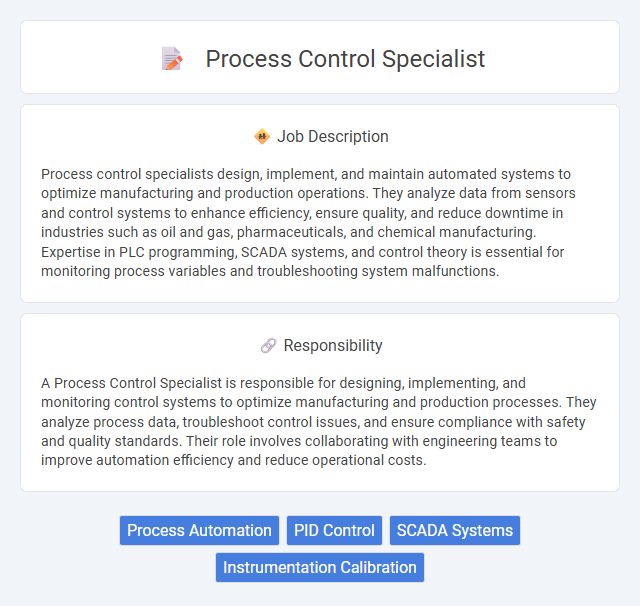
Process control specialists design, implement, and maintain automated systems to optimize manufacturing and production operations. They analyze data from sensors and control systems to enhance efficiency, ensure quality, and reduce downtime in industries such as oil and gas, pharmaceuticals, and chemical manufacturing. Expertise in PLC programming, SCADA systems, and control theory is essential for monitoring process variables and troubleshooting system malfunctions.
Individuals with strong analytical skills and a detail-oriented mindset are likely suitable for a Process Control Specialist role, as the job demands constant monitoring and optimization of industrial processes. Those who thrive in high-pressure environments and possess a solid understanding of engineering principles and automation technology may find this position a good fit. Conversely, people who prefer less technical or routine work might struggle with the job's complexity and fast-paced nature.
Qualification
A Process Control Specialist typically requires a degree in chemical engineering, industrial engineering, or a related technical field, combined with expertise in automation systems and control theory. Proficiency in programming languages such as Python, MATLAB, or PLC coding, along with experience in process simulation software, enhances job performance. Strong analytical skills, knowledge of quality standards like Six Sigma, and hands-on experience with SCADA systems are critical qualifications for effectively optimizing manufacturing processes.
Responsibility
A Process Control Specialist is responsible for designing, implementing, and monitoring control systems to optimize manufacturing and production processes. They analyze process data, troubleshoot control issues, and ensure compliance with safety and quality standards. Their role involves collaborating with engineering teams to improve automation efficiency and reduce operational costs.
Benefit
A Process Control Specialist likely benefits from improved operational efficiency and reduced production costs due to their expertise in optimizing manufacturing processes. Their role increases the probability of maintaining consistent product quality, which can enhance customer satisfaction and company reputation. There is also a strong chance they experience career growth opportunities, as their specialized skills are highly valued across various industries.
Challenge
Process control specialists likely face significant challenges in optimizing complex industrial systems while maintaining precision and efficiency. Balancing the integration of advanced technologies with existing infrastructure may present ongoing difficulties requiring adaptive problem-solving skills. The probability of encountering unexpected system behaviors necessitates continuous monitoring and rapid decision-making under pressure.
Career Advancement
A Process Control Specialist leverages expertise in automation, instrumentation, and system optimization to enhance manufacturing efficiency and product quality. Mastering advanced control strategies and gaining proficiency in AI-driven analytics can accelerate career progression toward managerial or consulting roles. Certifications in Six Sigma, Lean Manufacturing, and advanced PLC programming significantly increase opportunities for leadership positions in industrial automation.
Key Terms
Process Automation
A Process Control Specialist in process automation designs, implements, and monitors automated control systems to optimize manufacturing and production processes. They utilize advanced technologies such as PLCs, SCADA systems, and DCS to ensure precise control, improve efficiency, and reduce operational costs. Expertise in data analysis and system integration enables the specialist to enhance process reliability and support continuous improvement initiatives.
PID Control
A Process Control Specialist expertly designs, tunes, and optimizes PID controllers to maintain system variables such as temperature, pressure, and flow within set parameters, enhancing operational efficiency. They analyze complex industrial processes using advanced control theory and instrumentation to reduce variability and minimize downtime. Proficiency in control system software like DCS, SCADA, and PLC programming is essential for implementing robust and adaptive PID control strategies.
SCADA Systems
A Process Control Specialist skilled in SCADA systems manages automated industrial processes by designing, implementing, and troubleshooting Supervisory Control and Data Acquisition platforms to ensure optimal operational efficiency and real-time data monitoring. Expertise in configuring PLCs, HMI interfaces, and network communication protocols enhances system stability and minimizes downtime in manufacturing or energy production environments. Proficiency in analyzing control system data aids in predictive maintenance and continuous process improvement, boosting overall plant productivity.
Instrumentation Calibration
Process control specialists with expertise in instrumentation calibration ensure precise measurement and control of industrial systems by regularly calibrating sensors, transmitters, and control devices. Accurate calibration minimizes process variability, enhances operational efficiency, and ensures compliance with industry standards such as ISA and ISO. Their role is critical in maintaining process stability and safety in manufacturing, chemical, and petrochemical industries.
 kuljobs.com
kuljobs.com